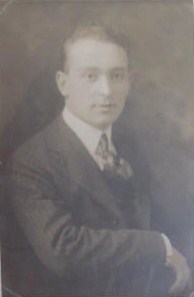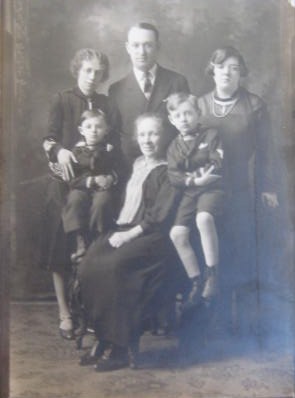Recollections of Odessa
By Ben Swartz as told to his granddaughter Judy
 Benjamin Chaim Davidovitch GELMAN
Benjamin Chaim Davidovitch GELMAN, adopted by stepfather Shloima CZORNYI, surname changed to SWARTZ in U.S. born 1896 in Odessa, emigrated to U.S. ~ 1912/1913
My grandfather had three names. He was born Benjamin Chaim Davidovitch GELMAN. After his parents divorced, he was adopted by his stepfather and his name became Benjamin CZORNYI. When he moved to the United States, he became Ben SWARTZ. As a child, I was fascinated by this and always tried to get my grandfather to tell me more about his family and growing up in Odessa, where he was born in 1896. He was very reluctant to do so, but one day when I was about 12, he let me “interview” him. Fortunately, I took good notes, and even more fortunately, I still have those notes, upon which the following is based.
“My family consisted of my mother, Beila, my stepfather Shloima, my half-sister Rose, my four step sisters and two stepbrothers.
“I lived in a tenement compound--a square building with a courtyard in the middle and one big door to enter. The door was locked at midnight. If you came home afterwards, you had to wake up the manager and pay him to let you in because the residents didn’t have keys. There was an outhouse in the back. There were no showers--we bathed in washtubs. The ten of us lived in an apartment which had a living room, two bedrooms and a kitchen. We slept all over. In the summer we would eat and sleep on the porch. The stove was brick with a grill in the middle. It used wood or coal. For furniture, we had beds, a table, benches, kerosene lamps and a sewing machine. Most of our clothes were home made. We only occasionally got something store bought.
“I didn’t like to go to cheder (school). When I was little the Rabbi would have to carry me on his shoulders to get me to go.
“When I was ten, I went to art school on Sunday mornings. I loved art and wanted to be a painter. I went for two years, and I had to walk about two miles to get there.
“For fun we would swim in the Black Sea in the summer. In the winter, we had home made skates, which we made from boards and heavy wire. One year I wanted a pair of stilts, but my mom wouldn’t let me get any. So I helped a carpenter who lived in our tenement for awhile so he would make me a pair. I was so proud of those stilts! I would walk around the courtyard and make lots of noise. But the neighbors complained and the manager took the stilts right out from under me. I was so mad I grabbed one of the stilts and broke it over the manager’s head. My family was almost kicked out of our apartment. I don’t know why they let us stay!
 Beila bat Yakov USVYATSKAYA
Beila bat Yakov USVYATSKAYA, married first David Boruchov GELMAN, divorced, then married Sloima CZORNYI in Odessa. mother of Benjamin Chaim Davidovitch GELMAN; surname changed to SWARTZ in U.S
“I also liked to fly kites, but we didn’t have any materials for them. So I would go up onto the roof and stay there until a kite would come close enough to grab. One time I almost fell off the roof!
“Another time I wanted to see the first Russian flyer, Anikei Utochkin. To get to the field where he was flying, I had to take several streetcars. Since I didn’t have any money, I would hang on the back and try not to be seen by the streetcar operator. If he saw me, he would hit my hands and make me jump off. Then I’d have to wait for the next streetcar and try again. But I got there!
“It seemed like I was always getting into trouble. One time a friend told me a sentence in Turkish and dared me to say it to the Turkish man who owned an apple cider stand. I didn’t know what the words meant, but I thought I’d be smart and said it to him. The man grabbed a big curved knife and chased me for blocks! I guess it must have been swear words.
I remember in 1905 there were a lot of pogroms. I would go up to the roof with the women and help them pour boiling water on the Cossack soldiers.
“Education was very important in our family. My uncle wanted me to go to a public high school after my Bar Mitzvah, but only 5% of the students could be Jews. So my uncle, who was an interpreter for the government, used his influence and paid some bribes to get me in. I had to buy several school uniforms--one for parading, one with twelve brass buttons and another with six. I went to Poly Tech High School. The first year we spent half a day (four hours) in the foundry learning steel work. The other four hours were spent in academic studies. There were a few women teachers who taught the Russian language and math, but the rest of our teachers were men. The second year emphasized carpentry, the third year the machinist’s trade and the fourth year was engineering and drafting.
“When I was in High School I played forward for our soccer team. One year a game was scheduled on Rosh Hashanah and my mother wouldn’t let me go. But I snuck out in the middle of services, all dressed up in my new shoes and shirt , and went to the game. While I was practicing, one of my shoes split open. They wouldn’t let me play in the game with a torn shoe, so I left. I was far from home and my shoe flopped along as I walked. I was close to the train depot and stayed there until it was dark because I was ashamed and afraid of getting a licking at home. Eventually I found a string, tied my shoe together and went home.
“I quit school two months before graduation and got a job in an export office. I was only sixteen, but I was in charge of directing cargo to the shipyards. After one month, I had earned $80.00 in commissions, three times as much as regular pay! I thought I was rich! I put my money in my pocket and went to the post office to pick up the company’s mail, one of my usual assignments. While I was there I bought a very strong cigar from a cigar peddler. I thought I was such a big shot! By the time I got back, I was sick from the cigar. My boss thought I was drunk and sent me outside to sober up. When I came back in, he fired me.
 Ben and Family
Ben and Family Back row: Sarah Rose ROSENSTEIN SWARTZ, Ben SWARTZ, Rosya/Rose LEVINE (half sister of Ben SWARTZ, born in Odessa 1904 to Beila and Shloima CZORNYI).
front row: Ray SWARTZ, son of Sarah Rose and Ben, Beila (known as Bertha in the U.S.) SWARTZ, Jack Shai SWARTZ,
son of Sarah Rose and Ben.
“Even though I had quit school, my uncle wanted me to go to college and become a ship’s captain. I went to apply. First I had to show my grades, which were good. But because I was Jewish, even if I kept my grades up, the man said I could never be a ship’s captain. The most I could hope for would be to be an assistant captain.
“Not too long after, my family decided to leave Odessa and emigrate to the United States. Everyone except me went to the U.S. in 1912, and I came over in 1913, by myself. I was only about 17 years old. I had to go from Russia through Poland to get to Germany and since I didn’t have a visa I was smuggled into Poland with fifty other people. We had to pay a bribe to get someone to take us across the border. That night, we slept in a barn, but there was a raid. I escaped and managed to cross the border on my own. Once I was in Germany, I was fairly safe. I took a train to the port city of Bremen where I was supposed to take a ship at 2:00 p.m. bound for Baltimore, Maryland. When I got there, I found the ship had left at 8:00 a.m.! They put me up in a hotel, but the accommodations were not too good and the food was worse. I was there for a month, until there was another ship scheduled to leave for Baltimore. I must have eaten fish three meals a day! But at least I wasn’t charged for it. One day I went to a park. Somehow I lost my wallet. I filed a police report, but it was never recovered. Since I didn’t have any money, I went to ask a local Rabbi for help. He asked me how much money I lost and I lied and said about 400 marks. Maybe the Rabbi figured I lied because he gave me 100 marks. But at least now I had some money.
“Once I got on the ship, I ate like a prince, but I paid for it. The journey took sixteen days, and I spent eight of them in the ship’s hospital, severely seasick.. After I arrived in Baltimore, I took a train to Columbus, Ohio, where my family lived.”
So ends the narrative of my grandfather’s life in Odessa. In America, he had several careers, working for the car industry in Detroit, then owning his own garage and finally becoming a construction manager. In retirement he returned to his beloved art and his oil paintings grace the homes of his children and grandchildren.
My grandfather left behind several family members. His mother, Beila USVYATSKY GELMAN CZORNYI, had two sisters, Leah and Tsippa. Leah USVYATSKY married Mishel Yankelev GRINBERG in 1897, and they had two children, Chaim Aysikh born in 1903 and Basya Khiena born in 1909. Tsippa married Yankel Srul Gershkov MAKAROVSKY in 1894. Anyone with information regarding either of these families , or suggestions as to how to find them (a Red Cross search turned up nothing), please contact Judy Petersen at KPeter3434@aol.com